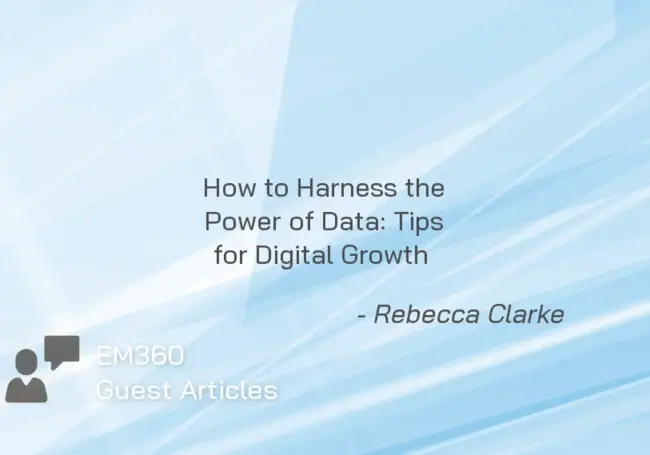This article was written by Rebecca Clarke of The Writer's Guild
Data lies at the intersection of many business processes across almost every sector and industry.
Advanced, scalable computing and modern IT infrastructure have increased the practicalities of working with large datasets.
It’s now safer, easier and quicker to store and recall large volumes of data, enabling businesses of any size to tap into the resource of modern big data analytics.
This ballooning sector’s meteoric rise is only set to continue; Statista forecasts that the global data and data analytics market is expected to be worth $274.3 billion by 2022 whilst the International Data Corporation forecasts AI spending to double between now and 2024.

What can your business do to harness the power of data?
Start Simple
Your business’s journey through data should start at the beginning.
What does every business have in common? Probably a website and/or social media platforms.
Most businesses funnel customers through these mediums and this should be your first port-of-call for data development and analysis.
Many businesses have a digital marketing and advertising strategy but many rarely measure their progress and success. For your website, start thinking about running and analysing SEO campaigns or analysing your PPC or other ad spending.
Use data platforms and SEO analytics suites like Ahrefs, SemRush, Moz and Google Analytics itself to discover and record data on your site traffic and customers.
You can find out everything from your on-page optimisation to backlinking status, ranking in the search engine results page SERPs) and SEO performance for different search terms and keywords.
The same applies to social media. Social media analysis can reveal huge amounts about your audience type and their mutual interests allowing you to refine campaigns and draft and design new content or products.
Analysing your site and social media traffic and engagement can highlight your best-performing posts and content whilst revealing valuable information about your customer base.
Audit your Website and Social media
Analyse your audience, traffic and engagement across both your website and social media. Every small aspect you can refine, tune and tweak adds up.
It might mean posting at a different time of day, or repurposing various high-traffic content to post across additional platforms - simple actions can amount to large gains.
Think Infrastructure
Databases and other data infrastructure were once incredibly expensive - businesses generally needed their own dedicated IT infrastructure purpose-built for their data needs. Also, for every data system, you need a secure backup, and there are energy costs to consider also.
This is now changing. Cloud computing has enabled businesses worldwide to tap into cost-effective, secure and scalable data resources with the likes of Amazon Web Services, Microsoft Azure and Google Cloud taking centre stage.
Cloud computing solutions are ideal for businesses that don’t need fixed, physical data infrastructure. However, cloud storage and computing are not always advantageous or suitable for businesses. If your business location has frequent internet outage or poor connections then cloud computing may not be suitable.
Also, the security of fixed facility data warehouses are hard to compare with cloud systems. Critical data may need to be physically safeguarded and protected by domestic laws or regulations.
Data Colocation
Data centre colocation is one solution that allows businesses to tap into the security and power of state-of-the-art physical data centres with cloud integration, secure backups and low-cost, green energy.
For businesses looking for a mix of physical and cloud data infrastructure, colocation provides a scalable alternative to in-house data infrastructure.
Automate Repetitive and Time-Consuming Tasks
Automation takes many forms and some are highly accessible and easy to adopt.
By automating tasks that are otherwise time-consuming, you can direct time and effort to tasks that drive growth in your business. Tasks such as bookkeeping and accounting, for example, are essentially important to any business, but they don’t necessarily create value in their own right.
AI accounting software like Xero can automatically read and audit your accounts, displaying financial information for easy analysis. The software will give a rundown of your accounts and payments over time displayed in tables and graphs.
This is one way of automating a time-consuming task (accounting) whilst also driving value for your business.
Automated Marketing
Marketing and advertising campaigns are another prime opportunity for automation. It’s possible to automate everything from social media campaigns to email marketing and ad campaigns, harnessing the power of data to refine your formulae and tweak future marketing campaigns based on past successes.
Marketing automation tools allow you to A/B different formats, styles and messages. You can analyse incoming traffic and click-through rates (CTRs) and compare times of day/triggers for sending marketing information to customers.




Comments ( 0 )